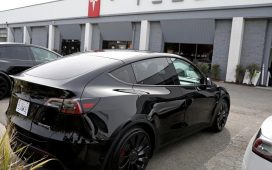Electric vehicles seem to be everywhere, with commercials, promotions and streets being flooded with the new way of driving, but this is a very Occidental and Asian centric way of seeing it, as there is one continent that has not embraced this new technology as fast as many would like, and that is Africa.
One can speculate about the reasons why electric vehicles have not been accepted into the African continent as fast as they have seemingly everywhere else, but the first thing to remember is that Africa is not a monolith and different countries have different needs even within the continent. The second thing to remember is the sheer scale of the continent and the countries within it, which might make it a bit harder to travel in a vehicle that barely has enough range to cover a couple of towns in rural areas.
Why Africa has not embraced electric vehicles and what countries are trying to change this
The first problem we encounter in Africa is still not range, unsurprisingly it is the cost of these new electric vehicles that are preventing the majority of the population from getting on the bandwagon. Some manufacturers have even expressed that an electric vehicle costs nearly double as much as a traditional gasoline-powered car, and when the choice is between spending double on a less reliable car, fossil fuel powered vehicles win every time.
But it is not just the price, many would be willing to bite the bullet and sacrifice some of their money to make electric vehicles in the continent happen, it is the lack of infrastructure that holds them back. The electrical infrastructure of many African countries, even in major cities is precarious as it was built quickly and has not been updated as often as it should have been considering the increase in electrical needs of their citizens. Adding another product that draws an enormous amount of power would be unadvisable, especially considering the tendency that governments have to “loadshed” (turning off power to millions of citizens for hours at a time to mitigate infrastructure problems).
Plus, the lack of charging stations is a problem in countries that have fully embraced electric vehicles, so it would be even worse in a continent where distances are so massive and where the more rural areas are underserved in so many ways.
But there is a movement to change this and bring African customers into the electric vehicle market, especially given that fossil fuel vehicles will hopefully stop being produced sooner rather than later and by then the infrastructure will need to be in place or risk not having any new vehicles in the continent.
One of the first countries to take this seriously has been Ethiopia, which has outright banned the import of new gas cars. But their problems are mounting due to lack of replacement parts, general education on how these electric vehicles are different than gas cars and qualified mechanics to ensure that repairs are made in a timely fashion.
Another country that seems to be taking on the challenge is Morocco, which has partnered with a UK-based electric vehicle maker, Atlas. The partnership aims to debut the continent’s first engineered battery-electric vehicle (BEV) conceived and developed in Africa by 2026. While this initiative marks a significant step, it is the results that will determine if the venture is feasible and worth repeating in other parts of the continent.
Problems will need to be tackled slowly and with care, as the infrastructure issues will need to be resolved first, in order to give the project a chance of survival.







